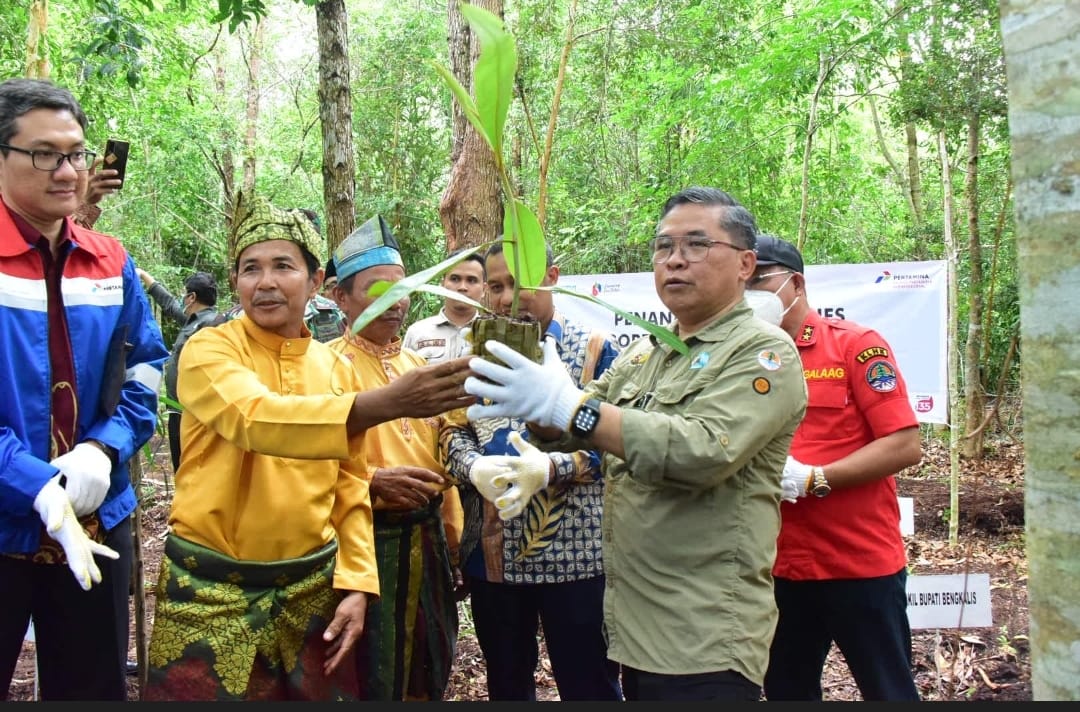
Deputy Minister of Environment and Forestry - Alue Dohong, Appreciates the Karhutla Mitigation Program of Independent Peat Village, Assisted by Sei Pakning Refinery
Bengkalis, May 23, 2022 - Deputy Minister of Environment and Forestry of the Republic of Indonesia, Alue Dohong, Ph.D., visited Bengkalis Regency and its surroundings to observe firsthand the communities' various efforts, institutions, and the business world in supporting efforts to mitigate peat forest fires and control climate change.
During his working visit, Alue Dohong had the opportunity to visit the Berdikari Peat Village on the Pakning River. Berdikari Peat Village is a community social responsibility program that is the flagship of the Sei Pakning Refinery. This program consists of various activities to prevent and reduce peatland fires while improving the community's economy.
"As the owner of the largest peatland, the Berdikari Peat Village program can be implemented in other regions. Indonesia must voice it out louder at the international level, especially regarding the role in peat restoration for climate change mitigation and control, including efforts to achieve NDC (Nationally Determined Land) Indonesia," said the Deputy Minister, Alue Dohong.
During his visit, Alue Dohong was welcomed by the Director of Human Resources and Business Support of PT Kilang Pertamina Internasional, Isnanto Nugroho, and General Manager of Refinery Unit II Dumai, Permono Avianto.
Activities centered on the Marsawa Gambut Arboretum, namely community forests in peat areas that still survive and are part of the Berdikari Peat Village Program. The Peat Arboretum is a place to preserve typical peat flora, such as bags of semar (Nepenthes sp) and is the first Peat Arboretum to be developed on Sumatera island.
Aloe Dohong also had the opportunity to plant Nephentes. In this location, there are 26 types of flora vegetation, with two species of which are rare and protected flora, namely Nepenthes Spectabilis (Vurnerable) and Nepenthes Sumatrana (Critically Endangered). Both florae are included in the protected flora based on the Regulation of the Minister of Environment and Forestry No. P.106/2018 (PSKL IPB, 2019).
“The program initiated by the Sei Pakning Refinery with the community in 2017 was initiated by the community's desire to prevent and mitigate the forest and peatland fires that always occur in Sei Pakning. Starting from Bukit Batu District, the Berdikari Peat Village program has been replicated to Siak Kecil and Bandar Laksamana sub-districts," explained Isnanto.
Various programs that have been running include strengthening the Fire Care Community group, Development of Integrated Pineapple Agriculture, Development of Peatland Agriculture with the Poligowo system, Peat Arboretum Preservation, Development of Peat Forest Honey Bee Cultivation, and educational programs for children, and the younger generation through the Peat Love School.
"What is encouraging is that our efforts in community-based forest and land fire mitigation have led the Sei Pakning Refinery to present the program's success in international events. Namely, at the Conference of the Parties in Madrid, 2019 and the United Nations Framework Convention on Climate Change, Glasgow, 2021," added Isnanto.
Furthermore, Alue Dohong expressed his appreciation because the program initiated by the Sei Pakning Refinery in 2017 has continued to develop with various innovations and has become the initiator of saving peatlands.
“This peat is a natural wealth as well as an economic asset, so it must be wise in its management and utilization. We see the efforts made in Sei Pakning year after year continue to develop. For instance, the innovation of the peat nozzle as a means of extinguishing forest fires on peatlands, the use of hydrant wells as portable wells that can be used to anticipate forest and land fires quickly," said Alue Dohong.
The Berdikari Peat Village Program is part of PT KPI's efforts to support sustainable development goals (SDGs) implementation, namely SDGs 8 Decent Work and Economic Growth, SDGs 13 Climate Change Management, and SDGs 15 Protecting Land Ecosystems.**